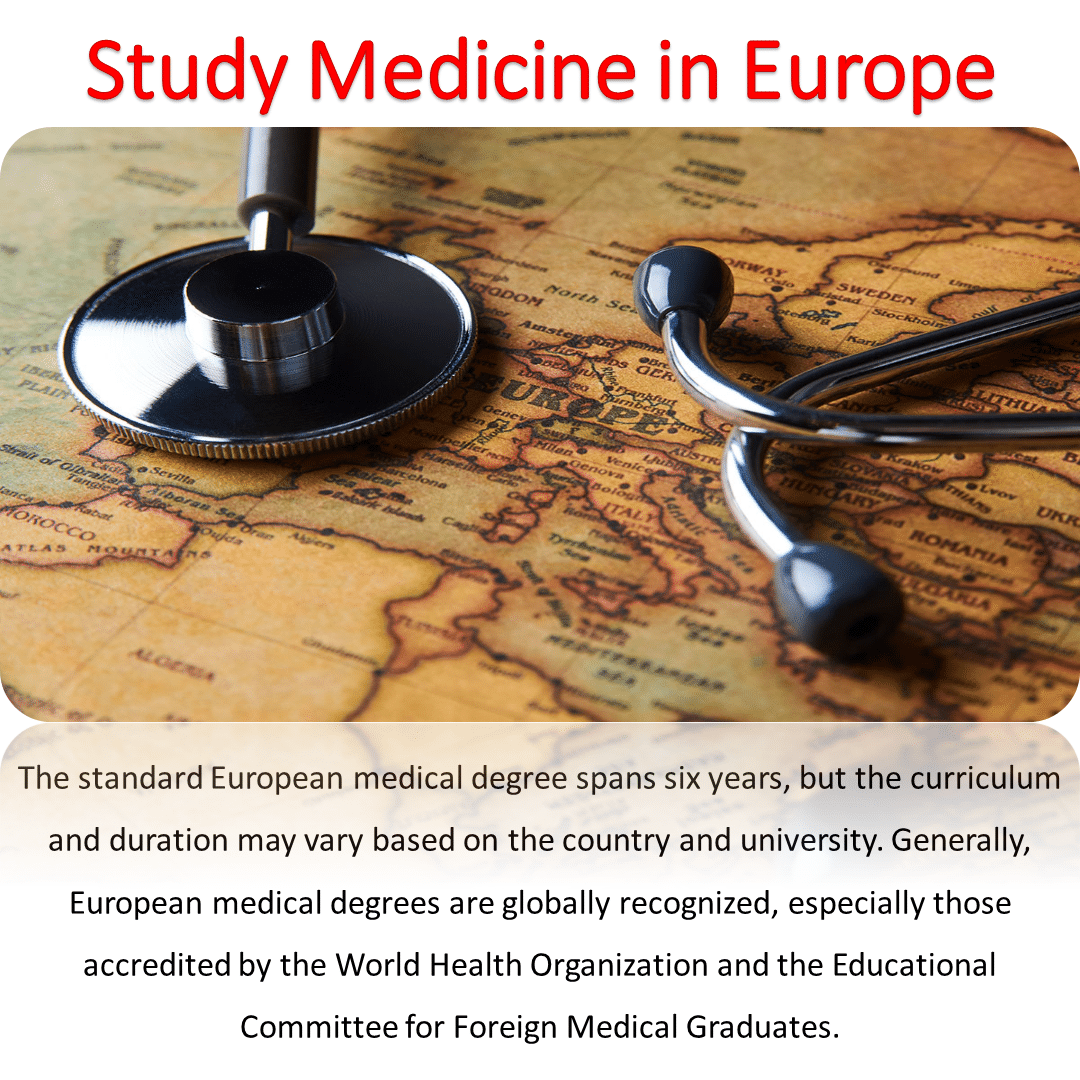Study Medicine in Europe

In this article, we will delve into the intricacies, advantages, and challenges of study medicine in Europe, in addition to the admission rates and expected fees in each European country.
Study Medicine in Europe is as diverse as its countries, cultures, and languages. From problem-based learning approaches in the United Kingdom to traditionally organized courses in Eastern European countries, there’s a place for every type of learner.
Major countries hosting renowned medical universities include the United Kingdom, Germany, Italy, France, and Northern countries, among others.
The standard European medical degree spans six years, but the curriculum and duration may vary based on the country and university. Generally, European medical degrees are globally recognized, especially those accredited by the World Health Organization and the Educational Committee for Foreign Medical Graduates.
The Admission Process in Medical Schools in Europe
The admission process varies from one country to another, but there are several common basic requirements. These include a high school diploma or its equivalent, proof of proficiency in English or proficiency in the relevant local language, and satisfactory results in entrance exams such as the UKCAT in the UK or the BMAT in Spain and the Netherlands, or the IMAT in Italy.
Some countries, like Germany and Italy, select students through national ranking systems, while others use methods such as interviews and personal statements for admission, like the United Kingdom. It is of utmost importance for applicants to conduct comprehensive research about the specific admission requirements of each university.
See Also: Study Medicine in France
The Cost of Study Medicine in Europe
Studying medicine in Europe can be a cost-effective option, especially when compared to the costs in the United States. Some countries like Germany, Norway, and Finland offer almost free education, even for international students, while other countries impose modest fees.
However, it’s also important to consider the cost of living, travel expenses, and the potential need for language courses in your budget.
The cost of studying medicine in Europe can range from being tuition-free to expensive, depending on the country and whether you’re a student from within or outside the European Union.
Keep in mind that the costs mentioned here are averages and may vary from institution to institution. Additionally, the cost of living is not included in these figures.
| Country | Average Fees per Year |
|---|---|
| United Kingdom | £10,000 – £38,000 |
| Germany | €1,500 – €10,000 |
| France | €2,770 – €3,770 |
| Italy | €1,000 – €4,000 |
| Spain | €6,300 – €21,600 |
| Netherlands | €6,000 – €15,000 |
| Sweden | SEK 80,000 – SEK 295,000 |
| Finland | €10,000 – €25,000 |
| Denmark | €45,000 – €65,000 |
| Poland | €3,000 – €6,000 |
| Hungary | €5,500 – €15,000 |
| Czech Republic | €10,000 – €18,000 |
| Romania | €5,000 – €9,000 |
| Bulgaria | €4,000 – €8,000 |
Teaching Language in Medical Schools in Europe
While many universities across Europe offer medical courses entirely in English, mastering the local language can greatly enhance your experience.
It helps in communicating with local patients during your medical studies in Europe and can increase your immersion in the native culture of the European country. Additionally, many European universities provide language courses for international students.
See Also: Best Medical Schools
International Recognition of European Medical Degree
Usually, a medical degree from a European university is well-regarded worldwide. However, it’s important to verify the acceptance of the degree in your home country or anywhere you plan to practice. For instance, the United States recognizes European medical degrees but requires graduates to pass the USMLE (United States Medical Licensing Examination) and complete a residency in the United States.
Acceptance Rates for Medicine in Europe
Here is a broad framework of competitiveness levels in some of the main European countries:
| Country | Competitiveness Level |
|---|---|
| United Kingdom | Very High |
| Germany | High |
| Italy | High |
| Spain | High |
| France | High |
| Poland | Easy |
| Hungary | Easy |
| Romania | Easy |
| Bulgaria | Easy |
See Also: Master’s in Surgery in UK
Please note that even in countries where the competitiveness level is considered average, getting into medical colleges is still a significant achievement and requires a high level of academic excellence and preparation.
Studying medicine in Europe can be a transformative and rewarding journey. While it comes with challenges, such as adapting to a new culture or language, the benefits – excellent education, global recognition, affordable tuition, rich cultural experiences, and an expanded professional network – often outweigh the drawbacks.
As with any significant decision, the key is thorough research and finding the option that aligns best with your career aspirations and personal preferences.
References
- Lifetime product updates
- Install on one device
- Lifetime product support
- Lifetime product updates
- Install on one device
- Lifetime product support
- Lifetime product updates
- Install on one device
- Lifetime product support
- Lifetime product updates
- Install on one device
- Lifetime product support